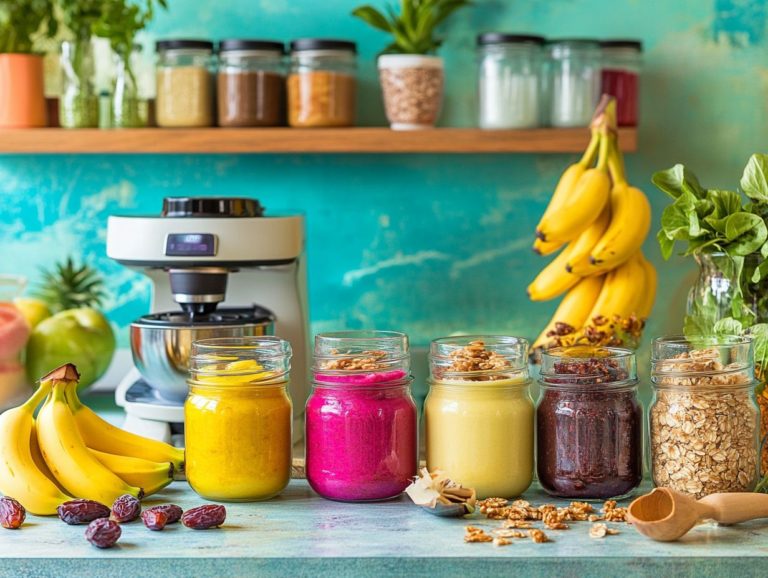Understanding Raw Dessert Sweeteners
In the realm of healthy baking, you ll find that raw dessert sweeteners have become quite the sensation, serving as delectable alternatives to refined sugar and artificial sweeteners.
From the rich notes of honey and maple syrup to the subtle sweetness of coconut sugar, agave nectar, and erythritol, these natural options not only enhance the sweetness of your creations but also infuse them with unique flavors and valuable nutritional benefits.
This article delves into the different types of raw dessert sweeteners, comparing them to refined sugar, artificial sweeteners, and sugar alcohols while offering tips for seamlessly incorporating them into your baking repertoire. It will also address any potential risks you might want to be aware of, such as health issues and cardiovascular risk. Prepare to elevate your desserts with the natural sweetness they deserve!
Contents
- Key Takeaways:
- Different Types of Raw Dessert Sweeteners
- 7. Stevia
- 8. Monk Fruit Extract
- How Do These Sweeteners Compare to Refined Sugar?
- How To Use Raw Dessert Sweeteners In Baking?
- Risks and Side Effects of Raw Dessert Sweeteners
- Frequently Asked Questions
- What are raw dessert sweeteners and their health benefits?
- What are the benefits of using raw dessert sweeteners, and what are the nutritional and health implications?
- What are some examples of raw dessert sweeteners?
- What are the dietary implications of using raw dessert sweeteners?
- Can raw dessert sweeteners be used in all types of desserts, and how do they compare to other sugar substitutes?
- Are raw dessert sweeteners suitable for vegans, and what are the food additives involved?
- Can raw dessert sweeteners be substituted for refined sugars in recipes, and what are the health risks?
Key Takeaways:
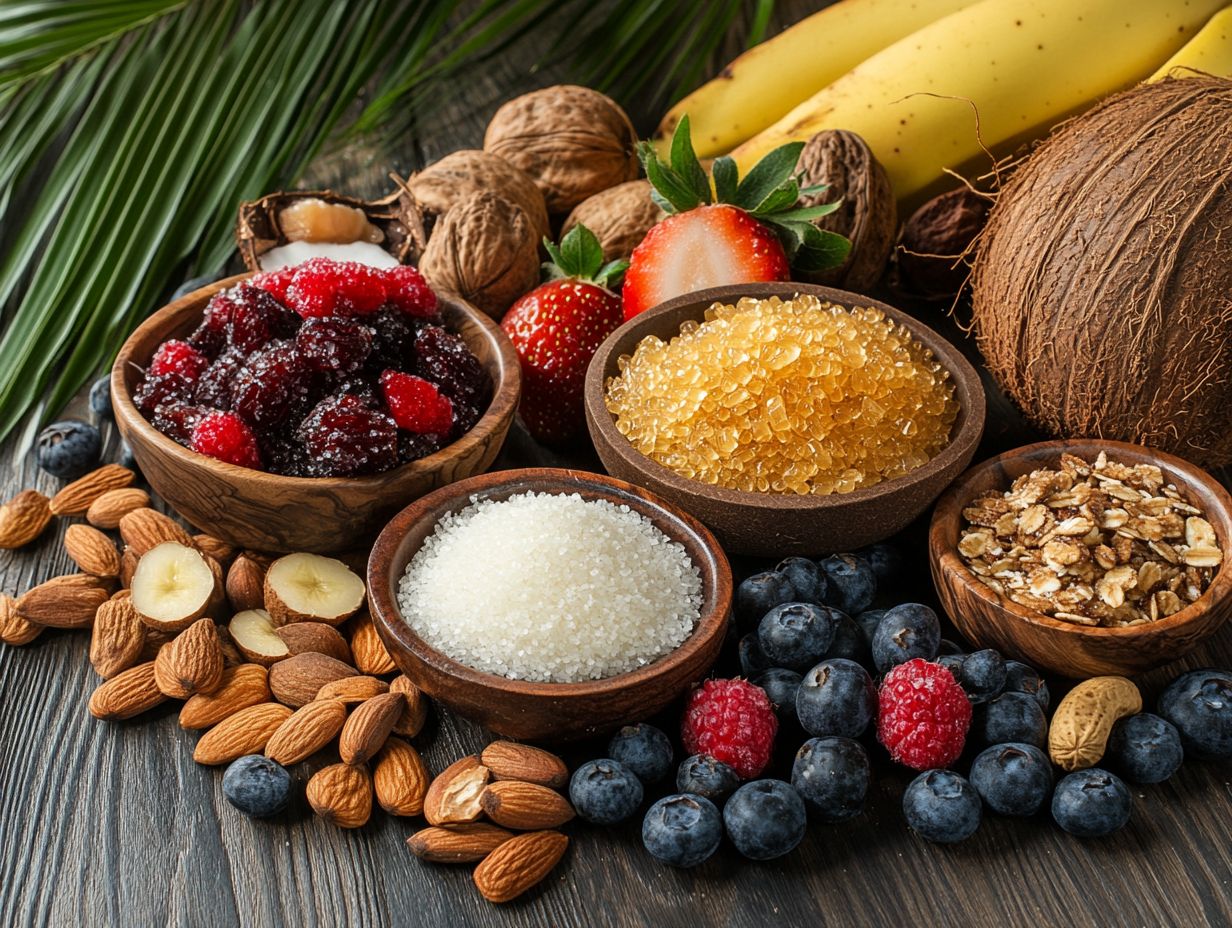
- Raw dessert sweeteners like honey and maple syrup have essential nutrients, lower sugar impact, and a unique taste compared to refined sugar.
- When using raw dessert sweeteners in baking, it’s important to adjust ratios and other ingredients to achieve the desired taste and texture, considering their unique properties compared to table sugar and artificial sweeteners.
- While raw dessert sweeteners can offer health benefits, it’s important to monitor allergies, overconsumption, and interactions with medications when incorporating them into your diet.
Different Types of Raw Dessert Sweeteners
Raw dessert sweeteners present a luxurious array of natural alternatives to processed sugars, inviting you to explore their unique flavors and potential health benefits. Among these, honey shines brightly, celebrated not just for its delightful sweetness but also for its storied history as a nourishing food, especially raw honey.
Maple syrup is another exquisite choice, cherished for its distinct flavor profile and potential nutritional advantages.
Coconut sugar, harvested from the sap of coconut trees, offers a low-calorie alternative frequently praised for its lower fructose content. Date syrup, derived from concentrated dates, is swiftly gaining popularity as a nutrient-dense sweetener.
Rounding out this impressive selection are agave nectar, blackstrap molasses, stevia, and monk fruit extract each boasting its own unique characteristics and culinary applications. These alternatives can be particularly beneficial for those managing metabolic syndrome or seeking to reduce sugar consumption. Embrace this diverse palette of sweeteners to elevate your dessert creations to new heights.
1. Honey
Honey is not just any sweetener; it s a natural delight that has been cherished for centuries, celebrated for its unique flavor and impressive health benefits.
Rich in antioxidants, honey plays a role in supporting heart health by alleviating oxidative stress and inflammation in your body. Unlike refined sugars, this golden nectar boasts a lower sugar impact, making it an excellent choice for those who wish to manage their blood sugar levels with grace.
However, it s crucial to keep moderation in mind, as indulging too much can still lead to unwanted glucose spikes. Integrate honey into your diet, and it doesn t just satisfy your sweet cravings; it also enhances your overall wellness, providing a boost in energy without the negative side effects often linked to artificial sweeteners.
2. Maple Syrup
Maple syrup is a cherished natural sweetener, renowned for its rich flavor and potential health benefits. When you take the glycemic index into account, it boasts a moderate score compared to refined sugars, making it a more suitable choice for those who are mindful of their blood sugar levels.
This exquisite sweetener offers a unique balance of sweetness and depth, enhancing a wide range of dishes, from pancakes to marinades. Maple syrup is packed with essential nutrients like manganese, zinc, and antioxidants, which can positively influence your overall diet.
Whether you drizzle it over your breakfast or incorporate it into your baking, maple syrup proves to be a versatile ingredient that not only elevates flavors but also aligns beautifully with a health-conscious lifestyle.
Try incorporating different raw sweeteners in your baking to experience the wonderful flavors and health benefits they bring!
3. Coconut Sugar
Coconut sugar, harvested from the sap of coconut trees, presents a low-calorie alternative to traditional sugars without sacrificing sweetness.
This distinctive sweetener is crafted by tapping the flower buds of coconut trees, collecting the sap, and then heating it to evaporate the water, resulting in delightful granulated sugar. What sets it apart is its significantly lower fructose content compared to standard table sugar. This makes it an excellent choice for those who are conscious of their sugar intake.
Beyond its lower glycemic index, which aids in better blood sugar management, coconut sugar seamlessly integrates into a variety of cooking and baking. It enhances your dishes and desserts with a rich, caramel-like flavor while offering a more natural sweetness. Additionally, it promotes better digestion, contributing to gut health.
4. Date Syrup
Date syrup, crafted by concentrating dates, is becoming a sought-after natural sweetener celebrated for its rich flavor and numerous health benefits.
This delightful syrup delivers a robust caramel-like taste and boasts an impressive nutritional profile. Its high fiber content is essential for promoting digestive health, aiding in regularity, and helping to prevent constipation.
As an excellent sugar substitute, date syrup enables you to satisfy your sweet cravings while enjoying its lower glycemic index compared to refined sugars. Don’t wait to improve your health; switch to date syrup now!
This quality makes it an enticing option for those who want to manage blood sugar levels without sacrificing flavor in their meals and snacks. It also aligns with the World Health Organization (WHO) advice on reducing sugar intake.
5. Agave Nectar
Agave nectar is a sweetener derived from the agave plant, often touted as a healthier alternative to traditional sugars. Its lower glycemic index indicates that it may have a milder influence on blood sugar levels compared to regular sugar and some other sweeteners. This makes it a tempting option for those aiming to manage their sugar intake.
This syrupy delight finds its way into a variety of culinary creations, from beverages and desserts to marinades, offering a rich flavor without the typical calorie overload. However, moderation is key; consuming too much can lead to health complications like weight gain or insulin resistance.
Incorporating agave nectar into your diet aligns with dietary recommendations for reducing sugar consumption. Thus, integrating it thoughtfully into an overall healthy diet is crucial for maintaining balance.
6. Blackstrap Molasses
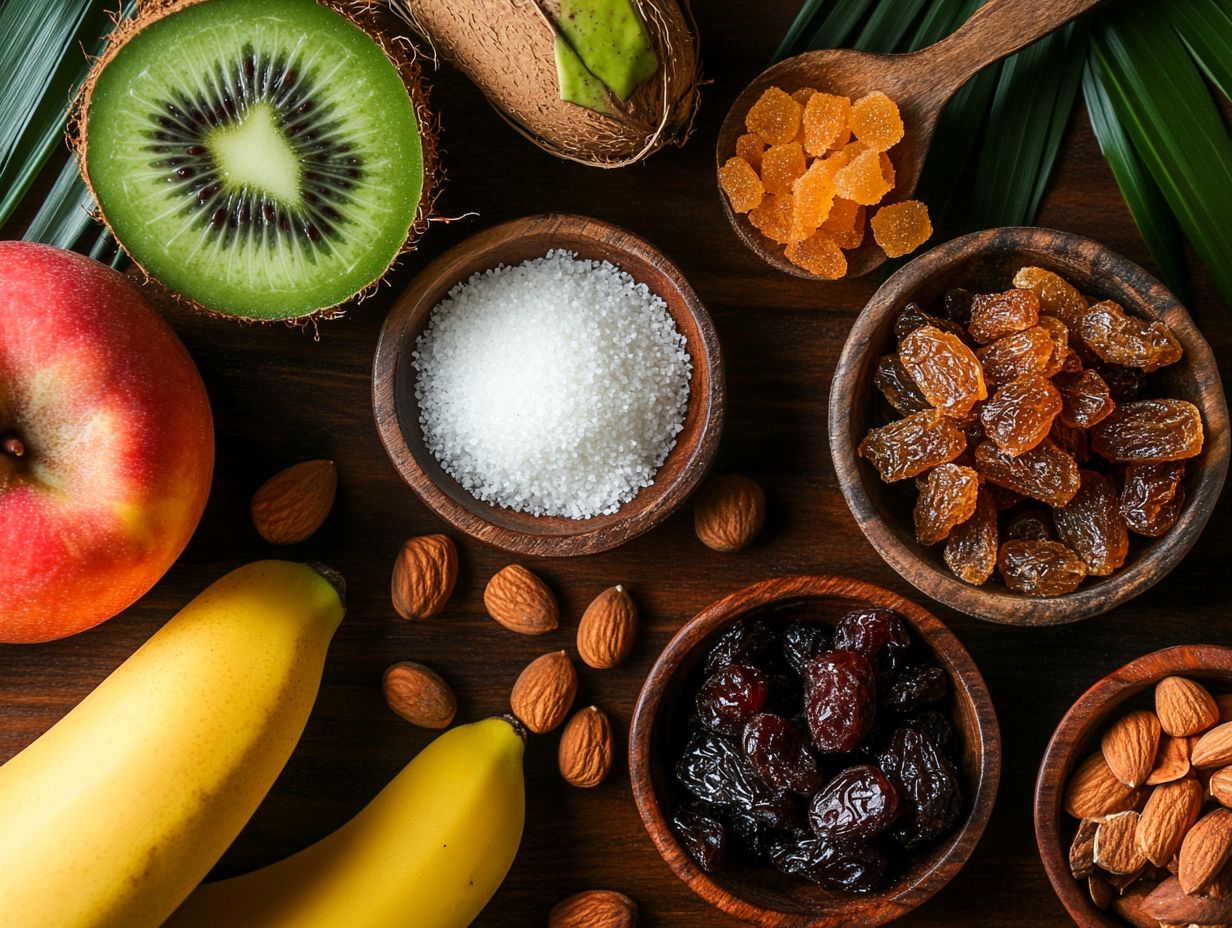
Blackstrap molasses is a remarkable byproduct of sugar production, celebrated for its robust flavor and impressive nutritional profile.
Unlike refined sugars that merely offer empty calories devoid of any real health benefits, this natural sweetener is a powerhouse of essential minerals like iron, calcium, magnesium, and potassium. These vital nutrients play a significant role in supporting various bodily functions and enhancing your overall well-being.
Incorporating blackstrap molasses into your diet may also assist you in managing your weight more effectively. It delivers a satisfying sweetness alongside nutritional benefits that promote a sense of fullness. By adding it to your recipes or using it as a healthier sweetener alternative, you can savor a delightful option that elevates your dishes while supporting your energy levels and nutritional objectives. Its benefits extend to heart health, given its rich nutrient profile.
7. Stevia
Stevia is a natural sweetener derived from the leaves of the Stevia rebaudiana plant. It serves as an excellent low-calorie sugar substitute for your culinary endeavors.
This remarkable sweetener offers a sweetness that can range from 50 to 300 times greater than ordinary sugar. This allows you to indulge in sweet flavors without the accompanying calories. As a sugar alternative, it s particularly attractive for those managing weight or diabetes since it doesn t cause blood sugar levels to spike. Dr. Stanley Hazen at the Cleveland Clinic has noted its potential in managing glucose levels effectively.
While stevia presents potential benefits, such as reducing calorie intake and promoting dental health, moderation remains crucial. Too much can upset your stomach or lead to other mild side effects. So, as you incorporate this sweetener into your balanced diet, it’s wise to consider your personal tolerance and overall health.
8. Monk Fruit Extract
Monk fruit extract is a remarkable natural sweetener derived from monk fruit, renowned for its delicious sweetness without the calories associated with traditional sugars.
This extraordinary fruit, hailing from Southeast Asia, has been cherished for centuries by local cultures for its delightful flavor and reputed health benefits. Its allure as a sugar alternative lies in its ability to deliver a satisfying sweetness. This makes it a highly appealing choice for those looking to satisfy their sweet cravings without the guilt typically linked to higher-calorie sweeteners. The American Diabetes Association recognizes its benefits in controlling glucose levels.
By opting for monk fruit extract, you can enjoy sweet flavors while managing your caloric intake. This promotes a more balanced and enjoyable dietary approach.
How Do These Sweeteners Compare to Refined Sugar?
The comparison between natural sweeteners and refined sugar often highlights the lower impact on blood sugar and additional nutritional benefits of the former. Unlike refined sugar, which can contribute to metabolic syndrome and other health risks, natural sweeteners can offer a more balanced approach to sugar consumption.
Artificial sweeteners like sucralose and neotame are often used as sugar substitutes, but they come with their dietary implications and potential long-term effects on health. When you compare natural sweeteners to refined sugar, you’re analyzing their nutritional value, how quickly they raise blood sugar, and overall taste. These factors play a crucial role in shaping your health, dietary choices, and heart health. Using alternative sweeteners could reduce the cardiovascular risk associated with high sugar consumption.
1. Nutritional Value
The nutritional value of natural sweeteners stands in stark contrast to refined sugar, leading to varying health implications. These natural alternatives typically retain essential vitamins and minerals, such as potassium, magnesium, and certain B vitamins, which are often stripped away during the refining process.
Additionally, natural sweeteners offer nutritional benefits that refined sugars lack. The antioxidants in these sweeteners can contribute positively to your overall health, offering much more than just empty calories. This is why many health professionals, including those from Cleveland Clinic and the Centers for Disease Control and Prevention, highlight the health benefits of natural sugars and alternative sweeteners.
When considering your options for sweeteners, remember that while natural sweeteners can provide added nutritional benefits, it s still crucial to monitor your overall caloric intake and sugar intake.
Consuming high amounts of any sweetener, even the natural ones, can lead to excessive caloric consumption, potentially negating any advantages they may offer. So, balance is key in your journey toward healthier choices and weight control.
Start making smarter choices today to enjoy your sweet treats guilt-free! Don t wait make the switch to natural sweeteners today!
2. Glycemic Index
The glycemic index (GI) of sweeteners is an important factor in assessing their influence on blood sugar levels. This shapes dietary guidance for those managing diabetes or striving for improved overall health.
You ll find that different sweeteners come with a range of GI values. Raw dessert sweeteners frequently boast lower GI scores compared to their refined counterparts. For example, natural sweeteners like agave syrup and honey often present themselves as healthier alternatives, thanks to their moderate GI rankings.
In contrast, the refined sugar lurking in many processed foods can trigger a swift spike in blood glucose. This intensifies the risks tied to metabolic syndrome, which is a group of conditions that increase your risk for heart disease, diabetes, and stroke. Grasping these nuances is vital for anyone looking to refine their diet.
By opting for lower-GI sweeteners, you can help stabilize your blood sugar levels and diminish the chances of developing insulin resistance. Choose lower-GI sweeteners today to start stabilizing your blood sugar levels.
3. Taste
Taste is a subjective yet crucial factor when comparing sweeteners. It significantly influences your preferences and cravings for sweets.
The intricate dance of flavors from the straightforward sweetness of sugar to the distinctive aftertastes of artificial sweeteners plays a vital role in how these ingredients fit into your recipes. This also affects how satisfying they are for your sweet tooth.
For example, while you might be drawn to the intense sweetness offered by substitutes like aspartame, neotame, or stevia, others may find themselves longing for the more balanced flavor profile that natural sugars deliver.
These diverse sweet experiences can trigger cravings that are fueled by health considerations and the joy of specific flavors. It’s important to consider the health risks of high sugar consumption while indulging.
How To Use Raw Dessert Sweeteners In Baking?
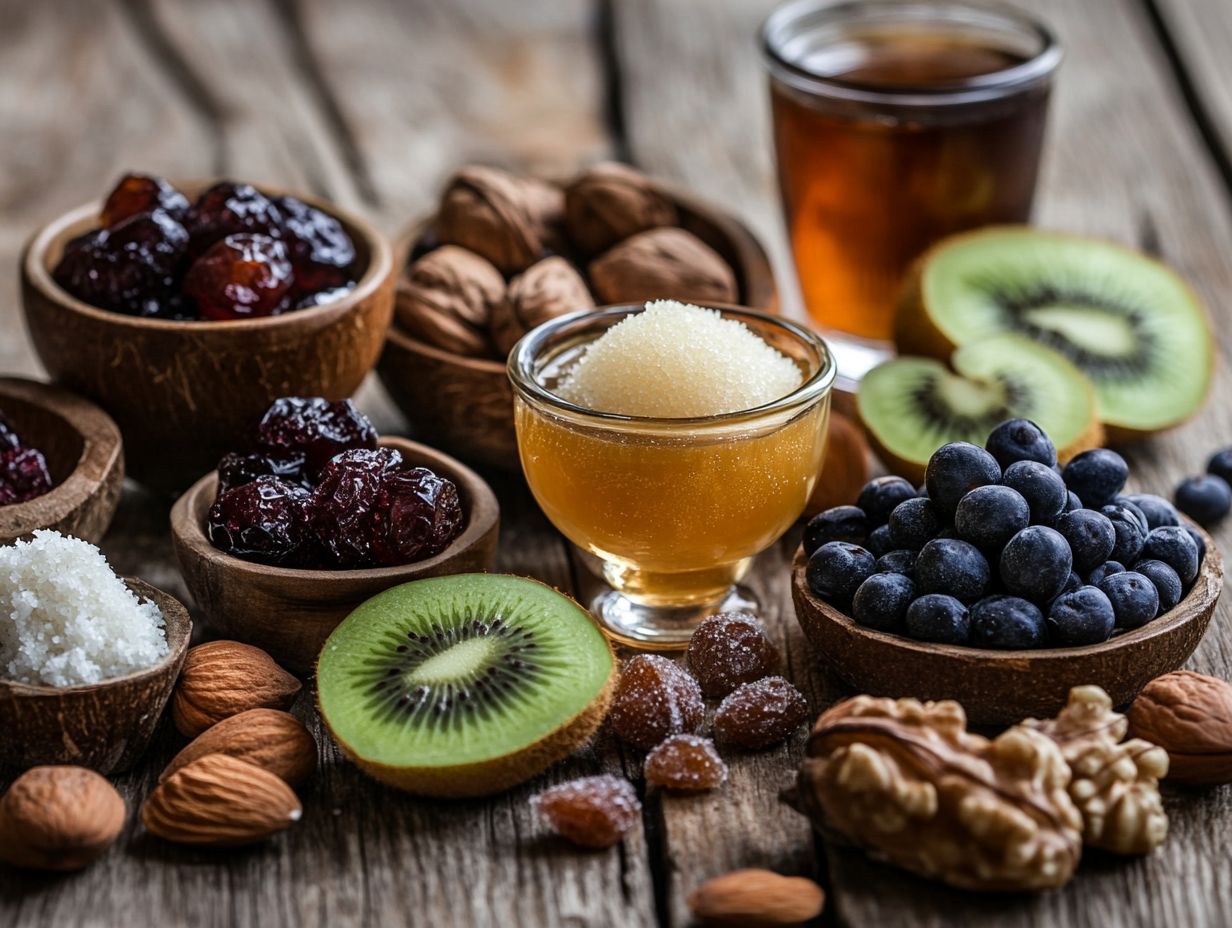
Using raw dessert sweeteners in your baking demands a thorough understanding of their unique properties. You’ll need to adjust your recipes to achieve the desired results while ensuring that the flavor and texture remain delightful.
Consult Food and Drug Administration guidelines for the usage of food additives and sweeteners safety.
1. Substitution Ratio
The substitution ratio for raw sweeteners in baking can vary significantly based on the type of sweetener you choose and its unique sweetness level compared to sugar.
Take honey, for example. When you opt for honey, the general guideline is to use about 3/4 cup of honey for every cup of refined sugar. Honey packs a stronger sweetness punch and adds moisture to your baked goods.
Raw honey is also rich in vitamins and antioxidants, offering additional health benefits. If you decide to use maple syrup, you’ll want to adjust to a 2/3 cup ratio. Since maple syrup has a higher moisture content, you may need to slightly reduce the liquid ingredients in your recipe.
For those considering agave nectar, it’s sweeter than table sugar, so the recommended substitution is also 2/3 cup. Just be aware that using agave can lead to a denser texture, subtly changing the mouthfeel of your finished product.
Grasping these ratios isn t just about achieving the right sweetness; it s also essential for fine-tuning the overall texture and flavor profile of your delicious baked treats.
2. Adjusting Other Ingredients
When you’re substituting raw sweeteners in your recipes, it’s crucial to adjust other ingredients accordingly. This ensures baking results that meet your expectations.
This consideration is especially important because raw sweeteners like honey, maple syrup, or agave nectar have varying moisture contents and sweetness levels compared to traditional granulated sugars.
For example, if a recipe calls for granulated sugar and you opt for a liquid sweetener instead, you’ll need to reduce the amount of other liquid ingredients, such as milk or water. This helps avoid ending up with a soggy final product.
Since these sweeteners can pack a serious punch in terms of sweetness, it s wise to cut back on the total quantity. Carefully balance them with leavening agents ingredients that help baked goods rise, like baking soda and baking powder.
This approach will help you maintain the desired texture and rise of your baked goods, ultimately leading to delicious outcomes.
By making informed choices, you can achieve delicious outcomes while embracing healthier sweetening alternatives.
3. Tips For Baking With Raw Dessert Sweeteners
Baking with raw dessert sweeteners can be a delightful task, but a few key tips and tricks can elevate your success while minimizing any potential health risks.
Consulting resources like the American Heart Association and American Diabetes Association can provide valuable dietary recommendations.
First and foremost, it’s crucial to pay attention to the sweetness levels of various raw sweeteners, as they can vary significantly from processed counterparts. Each sweetener boasts its own unique flavor profile; for example, raw honey offers a lovely floral note, whereas agave syrup presents a milder taste.
By understanding these nuances, you can significantly enhance your baking results. Practicing moderation with natural sweeteners is essential; overindulgence can lead to health complications, even with the best intentions behind their use.
By embracing these insights, you’ll create incredible desserts that everyone will love! Research from Nature Medicine and journals like Arteriosclerosis, Thrombosis and Vascular Biology indicate that moderation in sugar intake is crucial for long-term health.
Risks and Side Effects of Raw Dessert Sweeteners
While raw dessert sweeteners present a host of advantages, it s crucial to be aware of the potential risks and side effects associated with them. This awareness empowers you to make informed choices about your dietary selections.
Research from the World Health Organization emphasizes the importance of understanding the long-term effects of raw sweeteners.
1. Allergies
Some people may have allergies or sensitivities to certain raw sweeteners, leading to skin reactions, gastrointestinal distress, or respiratory issues.
Common raw sweeteners such as honey, agave syrup, and coconut sugar might trigger these responses in sensitive consumers. To pinpoint potential allergens, meticulously read ingredient labels for any listed allergens, and opt for products that clearly indicate they are free from specific known irritants.
Consult your healthcare provider or an allergist to aid in diagnosing particular sensitivities. This enables you to make informed dietary choices and avoid any unnecessary discomfort.
2. Overconsumption
Overconsumption of raw dessert sweeteners, like any sweetener, can pose health risks that you should carefully consider when making dietary choices. The World Health Organization and Dr. Stanley Hazen emphasize the importance of WHO advice on limiting overall sugar intake.
These risks can touch on various aspects of your health, from intensified cravings for sugary foods to potential disruptions in your metabolism.
If you regularly indulge in high amounts of these sweeteners, you might notice yourself developing a stronger preference for sweets, leading to a relentless cycle of cravings. This not only influences your appetite but can also lead to an increase in your overall caloric intake, potentially undermining any dietary goals you set for yourself.
Consequently, maintaining a balanced diet becomes more challenging, which can further heighten the risk of weight gain or other related health issues.
Start experimenting with these sweeteners today and discover new flavors in your baking!
3. Interactions With Medications
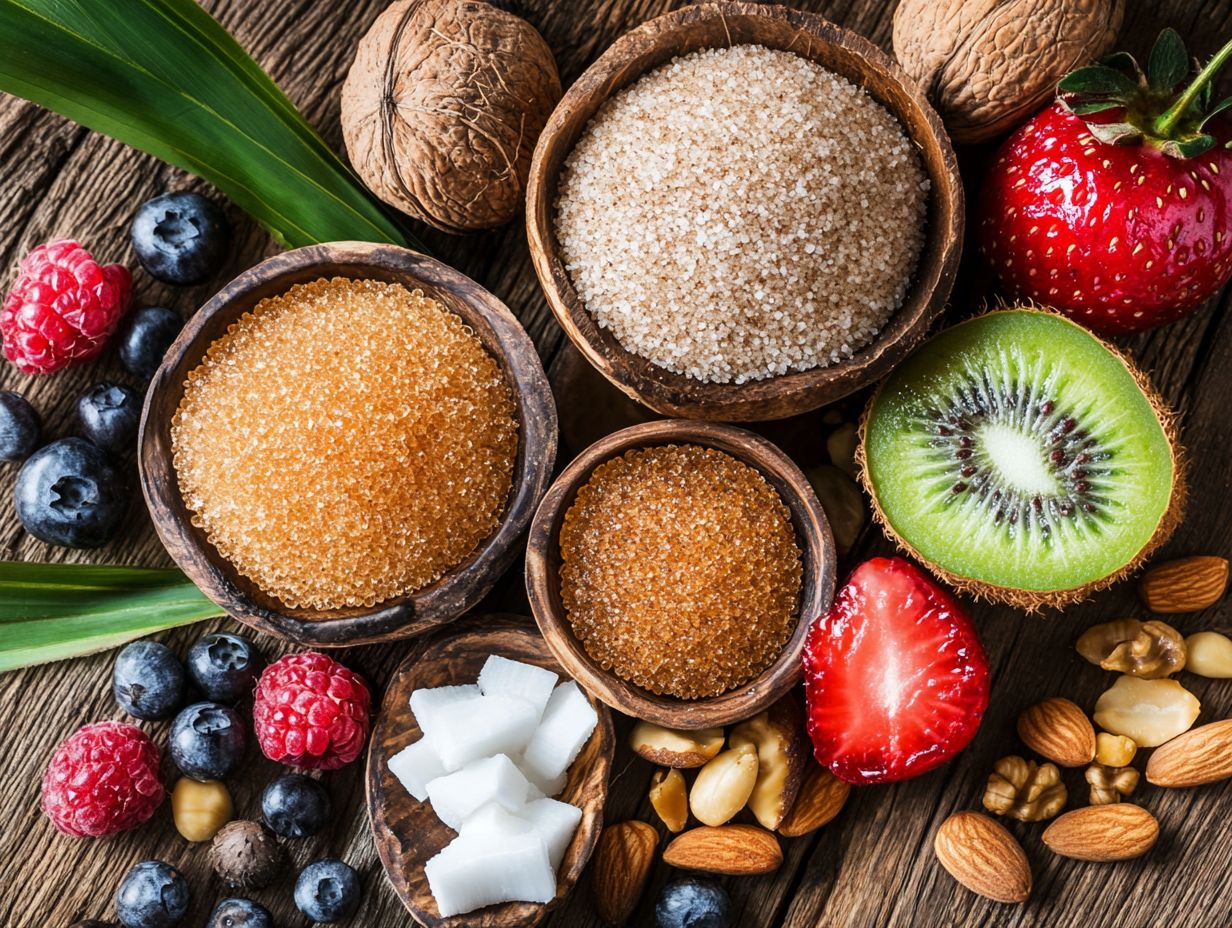
Certain raw dessert sweeteners may interact with your medications, leading to potential health concerns. These interactions might change how your body absorbs or metabolizes the medication, which might reduce its effectiveness or even worsen side effects. For example, people managing diabetes should be cautious with glucose-based sweeteners and consult their doctor.
Some naturally derived sweeteners can impact your blood sugar levels or hormonal responses, complicating treatment plans for those managing conditions like diabetes. Given this delicate balance, it s essential for you to consult healthcare professionals if you re considering adding these sweeteners to your diet. Always check with your physician before making significant changes to your food choices.
Not only can they offer personalized advice, but they can also help ensure that your dietary choices support your treatment, fostering overall well-being while minimizing risks. This approach can contribute to better gut health and dental health as well.
Be proactive about your health by discussing sweeteners with your doctor today!
Watch this video to learn more about raw dessert sweeteners.
For more information, consult the American Heart Association and American Diabetes Association for dietary recommendations.
Frequently Asked Questions
What are raw dessert sweeteners and their health benefits?
Raw dessert sweeteners are natural substances derived from plants or fruits, such as honey and maple syrup, that are used to sweeten desserts without undergoing any processing or heating. These sweeteners are often seen as sugar alternatives due to their natural origin.
What are the benefits of using raw dessert sweeteners, and what are the nutritional and health implications?
Raw dessert sweeteners provide a healthier alternative to refined sugars, as they contain more vitamins, minerals, and antioxidants. They also have a lower glycemic index, which measures how quickly foods raise blood sugar levels, making them suitable for those with blood sugar concerns and those following dietary recommendations for heart health and weight control.
What are some examples of raw dessert sweeteners?
Some examples of raw dessert sweeteners include honey, maple syrup, coconut sugar, dates, and stevia. Other alternatives like monk fruit, agave nectar, and sugar alcohols such as erythritol are also popular. These options are often minimally processed and preserve the natural nutrients found in the original plant or fruit.
What are the dietary implications of using raw dessert sweeteners?
Using raw dessert sweeteners can lead to a more nutrient-rich diet, as they often retain the vitamins and minerals found in their source ingredients. However, it’s essential to consider their impact on overall sugar intake.
Can raw dessert sweeteners be used in all types of desserts, and how do they compare to other sugar substitutes?
Raw dessert sweeteners can be used in a variety of desserts, such as cakes, cookies, and pies. They may have a slightly different taste compared to refined sugars like table sugar. It’s important to experiment and adjust the amount used accordingly to maintain the desired sweet taste in your food choices.
Are raw dessert sweeteners suitable for vegans, and what are the food additives involved?
Many raw dessert sweeteners, such as maple syrup, coconut sugar, and agave nectar, are suitable for vegans as they are derived from plants. However, some options, like honey, which is a type of raw honey, are not considered vegan-friendly. Additionally, artificial sweeteners like sucralose and neotame are not derived from natural sources and may not meet the criteria for those seeking natural sugars.
Can raw dessert sweeteners be substituted for refined sugars in recipes, and what are the health risks?
Raw dessert sweeteners can often be substituted for refined sugars in recipes, but it may require some adjustments to the amount and consistency of other ingredients. For optimal results and to avoid health risks such as weight gain and metabolic syndrome, it’s best to follow a recipe specifically designed for the type of raw sweetener being used. Also, consider the dietary implications and the long-term effects of regular consumption.



